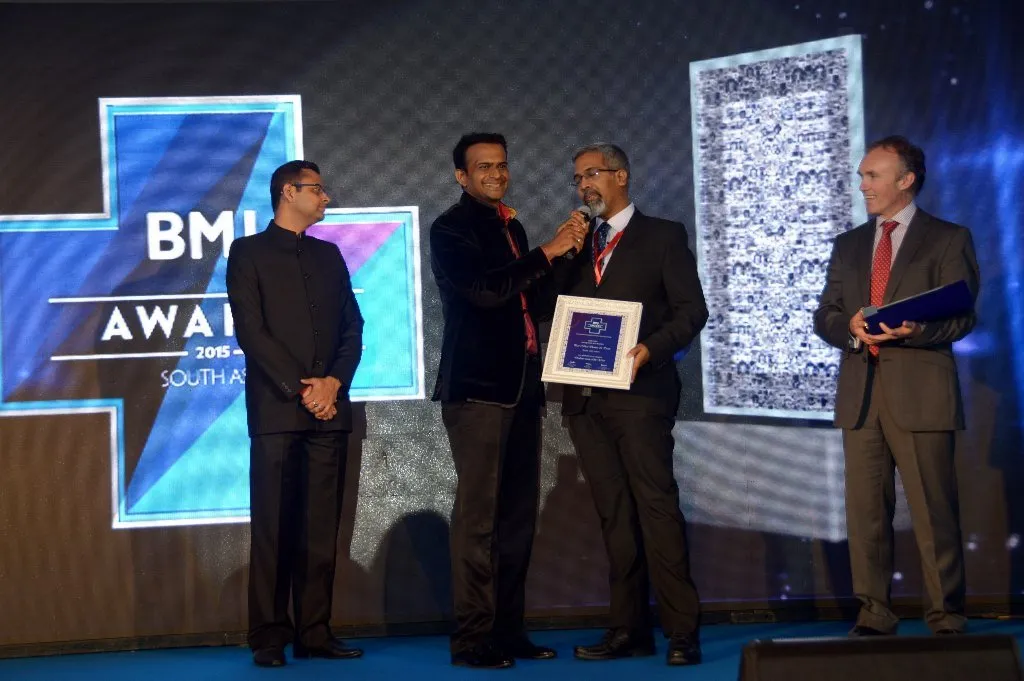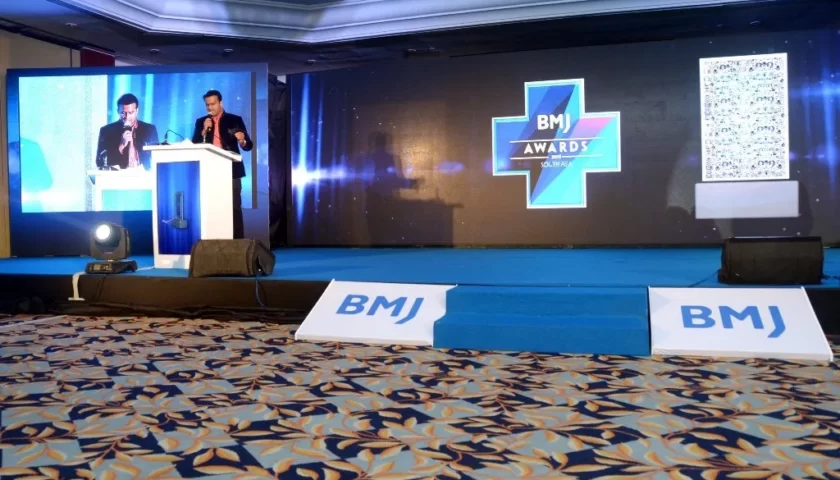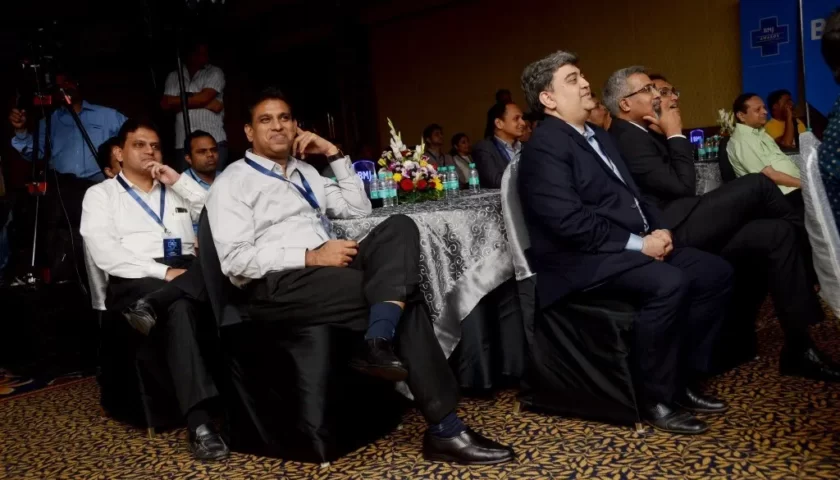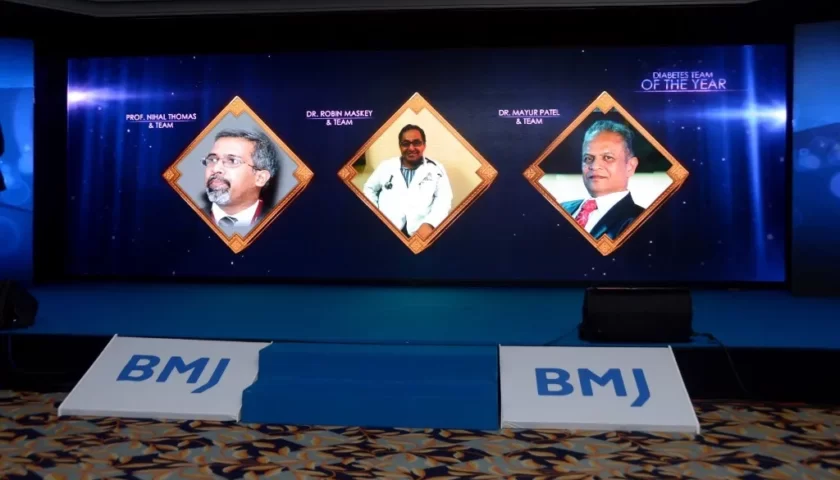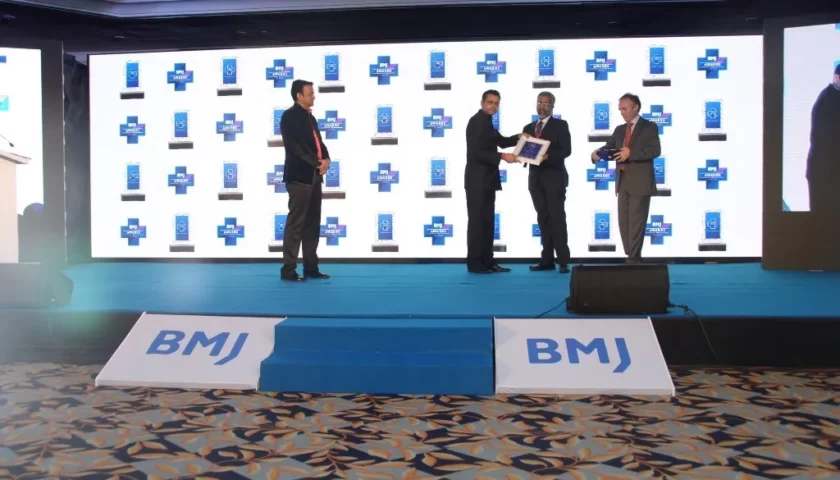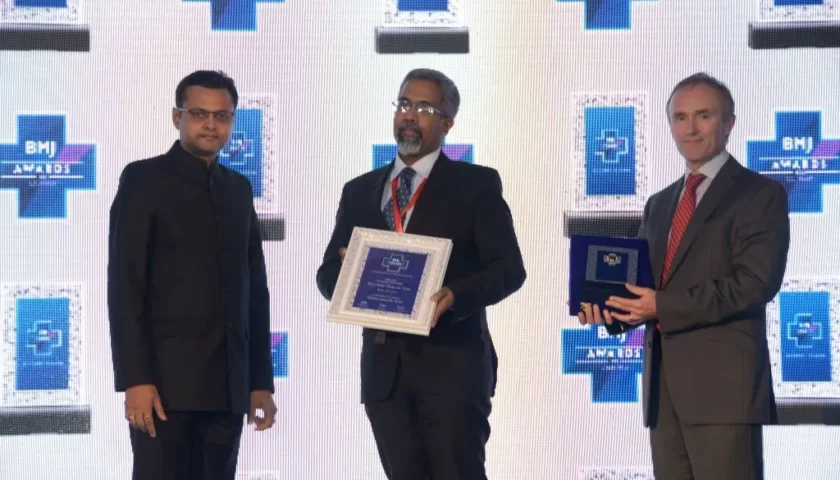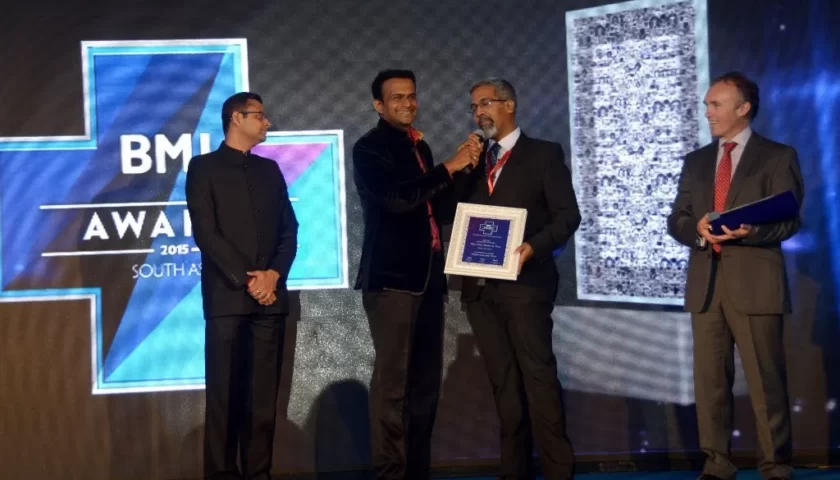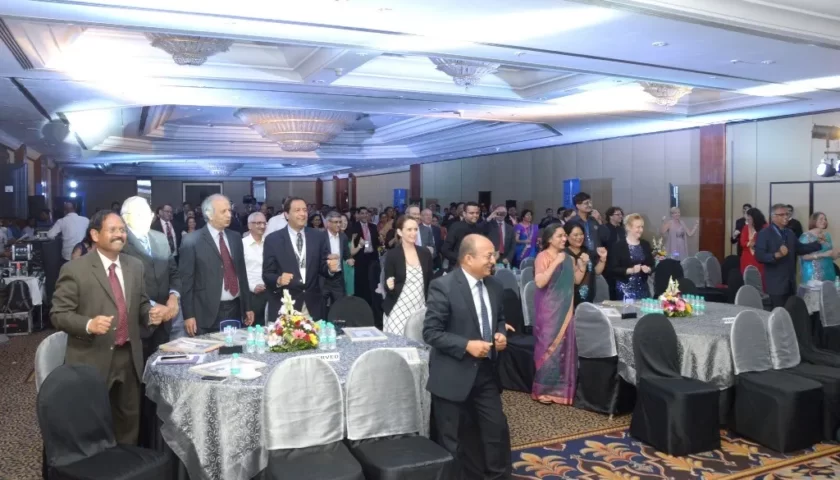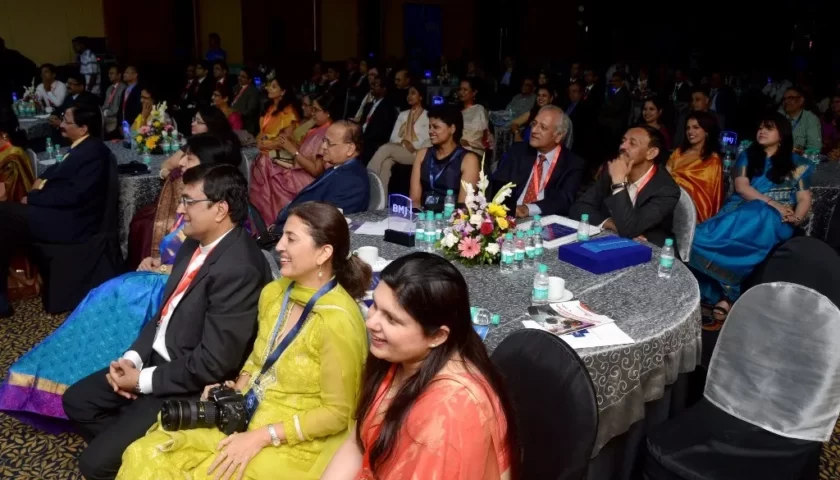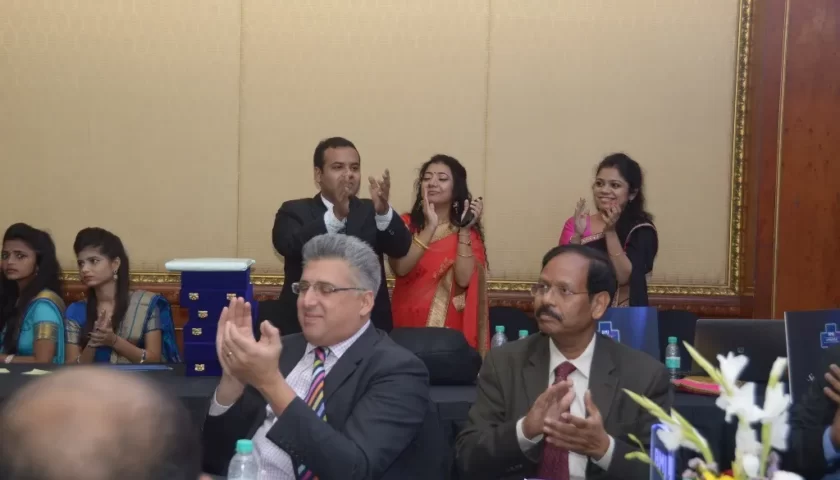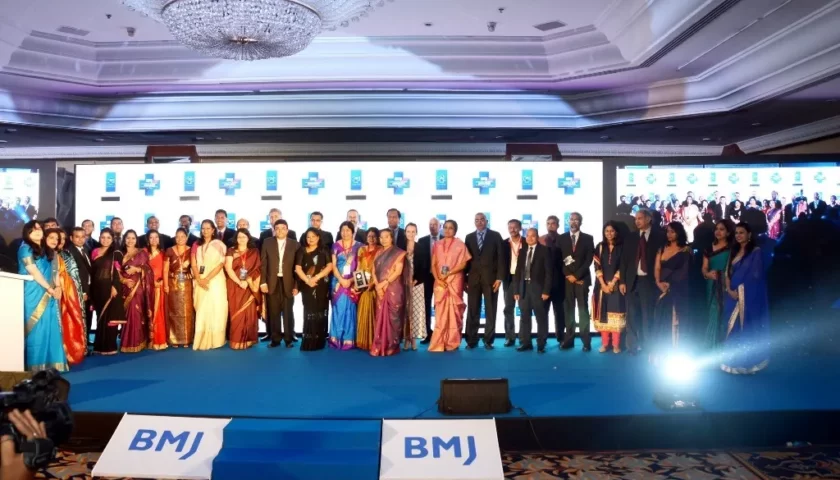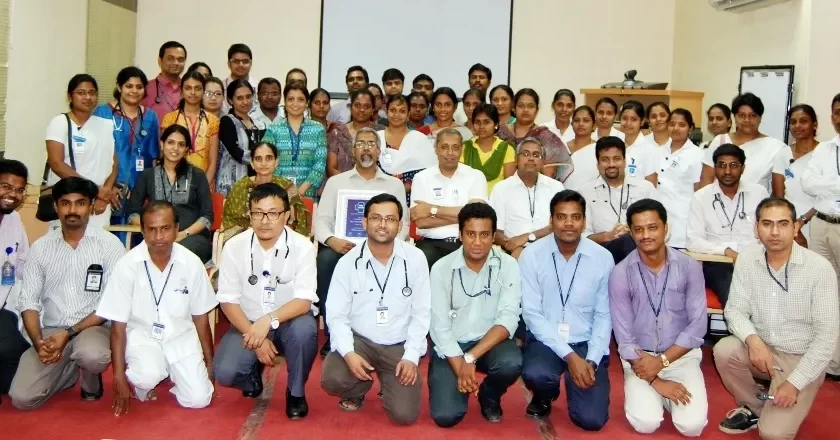British Medical Journal Award 2015
The Department of Endocrinology, Diabetes and Metabolism was bestowed the British Medical Journal South Asia, Diabetology Healthcare team of the year award for 2015 at a glittering valedictory ceremony conducted at the Leela Palace in Mumbai on October 30th, 2015, attended by a number of healthcare leaders, luminaries and academicians from across the world of health.
The British Medical Journal Health Care awards are amongst the most prestigious amongst the health-care sector in India and recognises teams and innovations particularly in clinical care, education and research. The awards have historically been instituted exclusively for India, for the last 5 years. However, on this occasion been extended beyond India to the South Asian countries of Pakistan, Nepal, Bangladesh, Bhutan, Sri Lanka, Maldives and Myanmar.
 There were more than 950 entries for the year 2015.
There were more than 950 entries for the year 2015.
The entire process of screening commenced in the month of June when those applicants were invited to submit their proposals. There were subsequently two rounds, one which short-listed 10 applicants in each category and the penultimate round which shortlisted 3 applicants for a final presentation in Mumbai on October 29th, 2015. Entrants had to make detailed submissions of their performance infrastructure, team abilities, innovations, limitations, challenges, sustainability and subsequent plans for evolution.
Supporting organizations included the Royal College of Physicians, British Cardiovascular Society, PlexusMD, National Health Portal, National Accreditation Board for Hospitals & Healthcare Providers (NABH), Médecins Sans Frontières (MSF), Sri Lanka Medical Association and Insignia.
There were 12 categories of awards which included Diabetology team, Cardiology team, Pulmonology team, Research Paper of the Year, Medical Team of the Year, Postgraduate Thesis of the year, Medical Education Team of the year , Innovation in Medicine, Improvements in Medicine and health-care journalist of the year.
The Department of endocrinology diabetes and metabolism was honoured with the award of Diabetology Team of the year, for its activities that have spanned nearly a decade and a half ,for all that it has contributed for patient care, educational activities, research, outreach activities and healthcare advocacy.
 The following points were highlighted. The core team consists of 60 members. The presence of a unique diabetes nurse educator run programme with 11 diabetes educators, which was the first initiated in 2001 and is the largest in the country. It fulfils the concept that chronic disease healthcare models can be handled by a team that is strongly supported by paramedical staff and cannot be entirely dependent on doctors. Internally, it enables the department to smoothly handle the care of more than 30,000 diabetes patients per annum. The department has now trained about 750 educators and councillors through programmes over the last 12 years, who serve in up to 20 states across the country. These educational programmes, which evolved from support from the World Diabetes Foundation and Project HOPE are now self sustaining and together with team work with the distance education department, and are now part of a programme which trains doctors nationwide. The unique aspect of this programme is that it is mandatory to train an educator in addition and the doctors have the prerogative to perform a project in diabetes in a resource poor setting. All the trainees are encouraged to get on to the CMC quality assurance programme for biochemical laboratories. Beyond this, the course material has evolved into a text book, which is now widely used and in its 7th edition and over the years has more than 50,000 copies being circulated. Doctors have been trained not only from remote parts of India, but also from some countries in Africa, the Middle east, Bangladesh, Nepal, Malaysia, Brunei and UK.
The following points were highlighted. The core team consists of 60 members. The presence of a unique diabetes nurse educator run programme with 11 diabetes educators, which was the first initiated in 2001 and is the largest in the country. It fulfils the concept that chronic disease healthcare models can be handled by a team that is strongly supported by paramedical staff and cannot be entirely dependent on doctors. Internally, it enables the department to smoothly handle the care of more than 30,000 diabetes patients per annum. The department has now trained about 750 educators and councillors through programmes over the last 12 years, who serve in up to 20 states across the country. These educational programmes, which evolved from support from the World Diabetes Foundation and Project HOPE are now self sustaining and together with team work with the distance education department, and are now part of a programme which trains doctors nationwide. The unique aspect of this programme is that it is mandatory to train an educator in addition and the doctors have the prerogative to perform a project in diabetes in a resource poor setting. All the trainees are encouraged to get on to the CMC quality assurance programme for biochemical laboratories. Beyond this, the course material has evolved into a text book, which is now widely used and in its 7th edition and over the years has more than 50,000 copies being circulated. Doctors have been trained not only from remote parts of India, but also from some countries in Africa, the Middle east, Bangladesh, Nepal, Malaysia, Brunei and UK.
The concept of outreach based support for diabetes patients who are local through social workers, who do visits to the worksites and at home is also a relatively novel concept. Another unique aspect of the programme is that is backed up by a strong foot care clinic, who have nurses who perform callosity removal, prescribe footwear by the orthotic unit which has a strong manufacturing programme for custom based foot-care and prosthesis. Additional support is given by the PMR physicians and the vascular surgery unit, thereby contributing towards a unique milieu with regards to team work. A footwear and foot-care training programme in conjunction with the Sri Lankan government has trained orthotists from 6 provinces in Sri Lanka, which now contribute towards footwear manufacture across different parts of that country. The Adult young diabetes clinic, has its' own patients who are referred from paediatric endocrinology or from elsewhere. It has a unique support group which is internal as well as links with other support groups from across the country at Haridwar as well as in the United States of America through video-conferencing and has support for those who are economically deprived from agencies such as the International Diabetes Federation and Marjorie's' fund. Audits have shown an improvement in glucose control with support groups and subsidy. The Epidemiological work involves the study of prevalence of diabetes across school children in Vellore and the prevalence of diabetes in the rural north-eastern states of India. Implementation of programmes to improve nutrition and physical activity amongst students are now underway. The clinical trial facility that performs, in-house as well as externally supported studies was also focused upon. The volume and quality of research in connection with the genetics of Maturity Onset Diabetes(MODY), Genome-wide Array studies(GWAS) through Karolinska university support and the state of the art hyperinsulinemic euglycaemic studies, caloriemetry and NMR spectroscopy, in those born low birth weight were also highlighted.
Other than the Diabetology team from Vellore, health care education involving CMC, Vellore's Secondary Hospital Programme for medical students were finalists at the event.


